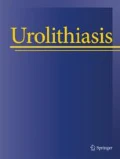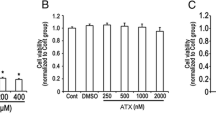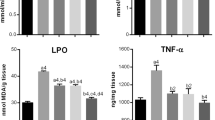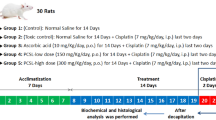Abstract
Oxygen-derived free radicals have been implicated in the pathogenesis of renal injury after ischemia-reperfusion. Caffeic acid phenethyl ester (CAPE), an active component of propolis extract, exhibits antioxidant and anti-inflammatory properties. To determine whether CAPE offers any advantage over α-tocopherol, we compared their effects on an in vivo model of renal ischemia-reperfusion injury in rats. CAPE at 10 μmol/kg or α-tocopherol at 10 mg/kg was administered intraperitoneally before reperfusion. Acute administration of CAPE suppressed ischemia-reperfusion induced renal lipid peroxidation and tissue injury more than α-tocopherol. CAPE may therefore offer a therapeutic advantage in acute injury settings.
Similar content being viewed by others
Author information
Authors and Affiliations
Additional information
Received: 9 October 2000 / Accepted: 23 February 2001
Rights and permissions
About this article
Cite this article
Irmak, M., Koltuksuz, U., Kutlu, N. et al. The effect of caffeic acid phenethyl ester on ischemia-reperfusion injury in comparison with α-tocopherol in rat kidneys. Urological Research 29, 190–193 (2001). https://doi.org/10.1007/s002400100185
Issue Date:
DOI: https://doi.org/10.1007/s002400100185




